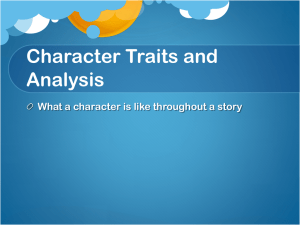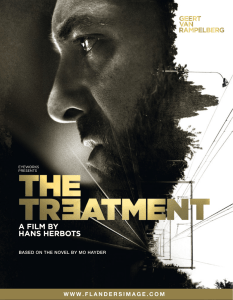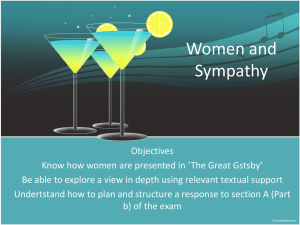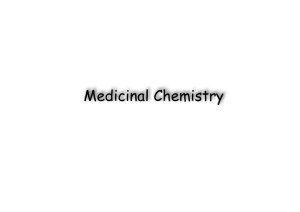Nick_Lydon_Laureation
advertisement
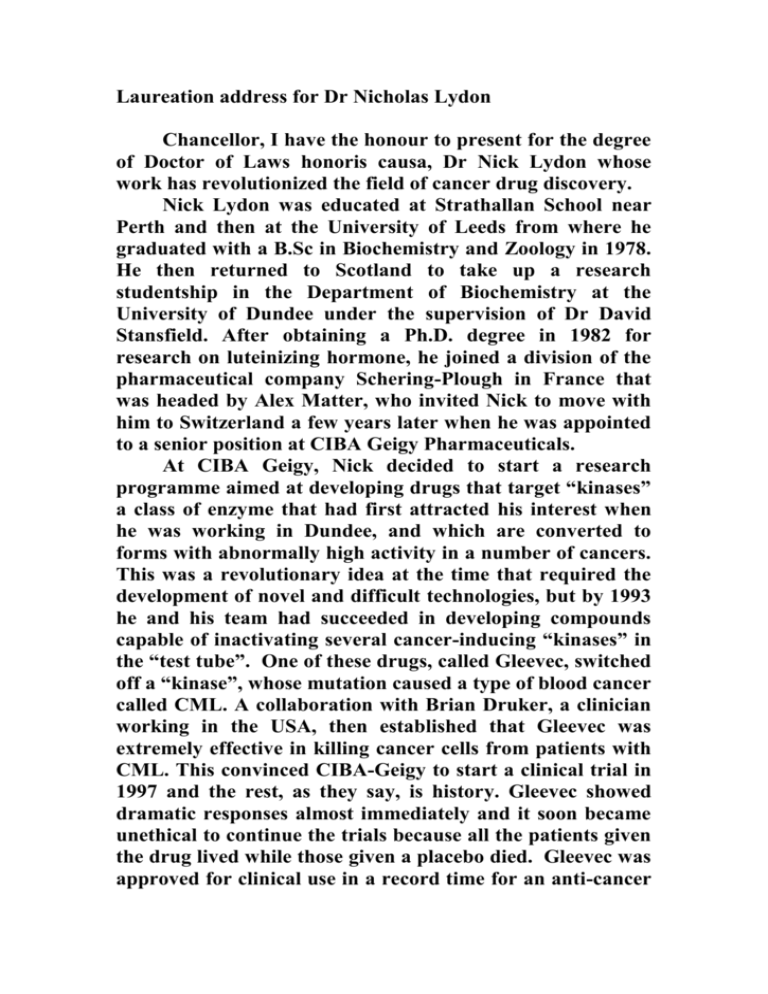
Laureation address for Dr Nicholas Lydon Chancellor, I have the honour to present for the degree of Doctor of Laws honoris causa, Dr Nick Lydon whose work has revolutionized the field of cancer drug discovery. Nick Lydon was educated at Strathallan School near Perth and then at the University of Leeds from where he graduated with a B.Sc in Biochemistry and Zoology in 1978. He then returned to Scotland to take up a research studentship in the Department of Biochemistry at the University of Dundee under the supervision of Dr David Stansfield. After obtaining a Ph.D. degree in 1982 for research on luteinizing hormone, he joined a division of the pharmaceutical company Schering-Plough in France that was headed by Alex Matter, who invited Nick to move with him to Switzerland a few years later when he was appointed to a senior position at CIBA Geigy Pharmaceuticals. At CIBA Geigy, Nick decided to start a research programme aimed at developing drugs that target “kinases” a class of enzyme that had first attracted his interest when he was working in Dundee, and which are converted to forms with abnormally high activity in a number of cancers. This was a revolutionary idea at the time that required the development of novel and difficult technologies, but by 1993 he and his team had succeeded in developing compounds capable of inactivating several cancer-inducing “kinases” in the “test tube”. One of these drugs, called Gleevec, switched off a “kinase”, whose mutation caused a type of blood cancer called CML. A collaboration with Brian Druker, a clinician working in the USA, then established that Gleevec was extremely effective in killing cancer cells from patients with CML. This convinced CIBA-Geigy to start a clinical trial in 1997 and the rest, as they say, is history. Gleevec showed dramatic responses almost immediately and it soon became unethical to continue the trials because all the patients given the drug lived while those given a placebo died. Gleevec was approved for clinical use in a record time for an anti-cancer agent. A follow-up study showed that, remarkably, 90% of the patients given the drug were still alive and well five years later, all of whom would have died within weeks before the invention of Gleevec. Gleevec, which is taken orally as a pill, has changed CML from a fatal cancer into a manageable condition. It is also effective in treating an intestinal cancer called GIST, because additionally it switches off a different “kinase”, whose mutation causes this disease. The current worldwide sales of Gleevec currently exceed £2 billion per annum making it the most important drug in the portfolio of Novartis, the company formed by the merger of CIBA-Geigy and Sandoz in the mid 1990s. Gleevec has not only saved the lives of thousands of people, but has revolutionized the field of cancer drug discovery. About 60% of cancer R&D in the pharmaceutical industry today is now focused on developing drugs that target “kinases”. Seventeen such drugs have subsequently been approved for clinical use, and over 150 more are undergoing clinical trials. The current market for drugs that target “kinases” is £10 billion per annum, which is predicted to double by 2020. For these discoveries, Nick and the clinician Brian Druker were jointly awarded a number of major research prizes, including, in 2002, the Kettering Prize from General Motors, one of the world’s most prestigious cancer research prizes and, in 2009, The Lasker Clinical Research Award, second only to the Nobel Prize in it prestige. When Gleevec started clinical trials in 1997, Nick Lydon decided to leave Novartis and set up his own company in Boston, USA. Called “Kinetix”, this company exploited novel and improved technologies to develop several new anti-cancer drugs that target “kinases”, one of which has now reached the most advanced stage of clinical trials and is likely to be approved soon for the treatment of several cancers. Indeed, Nick’s company Kinetix was so successful that it was acquired in 2000 by Amgen, the world’s largest biotechnology company and led to Nick moving to California to become Vice President for Amgen’s cancer research programmes. However, a couple of years later Nick decided to leave Amgen and, in what he calls “a mid life crisis”, spent a year thinking about what he wanted to do next. He moved to Jackson Hole in Wyoming, a remote region in the Rocky Mountains, where he indulged his passion for skiing and climbing mountains, originally kindled by outings to the Glenshee ski area when he was a Ph.D. student at Dundee. He then joined the company Ambit Biosciences and became involved in developing another drug that is showing promise for the treatment of another type of leukaemia called AML. He also founded a company called Anaptys Bio in 2005. Based in San Diego, California, this company uses improved methods to produce antibodies for cancer therapy. This year he has founded two more companies in Boston, USA. One called Staurus is aimed at developing antibodies as novel antibiotics to fight the pathogenic bacterium, Staphylococcus aureus, while the other, called Blueprint Medicines, is aimed at developing personalized medicines for cancer. Nick still lives in Jackson Hole, Wyoming, where he is particularly proud of the Medical Clinic that he and his clinician partner Sally have founded to provide improved health care for the largely rural community who live around Jackson Hole. In their spare time Nick and Sally both enjoy riding their horses, while Nick also competes in sailing races in his F18 Catamaran. He continues to ski in the rocky mountains and, although no longer climbing mountains, he still goes mountain biking in the Summer. Chancellor, I have the honour to invite you to confer upon our distinguished alumnus Dr Nick Lydon, the degree of Doctor of Laws.

